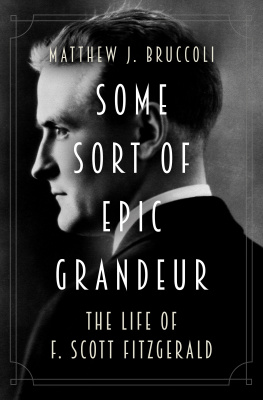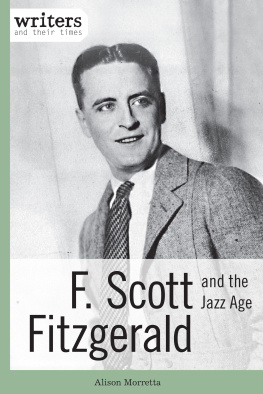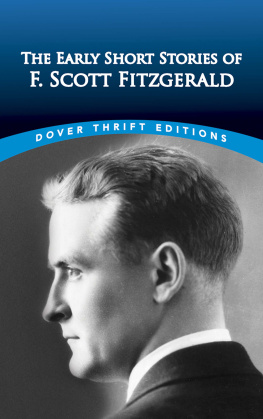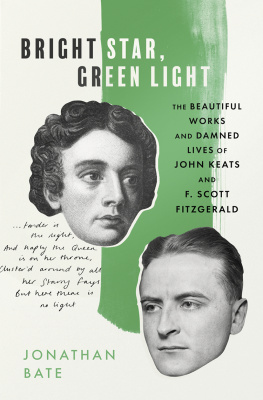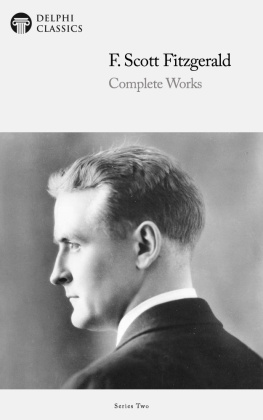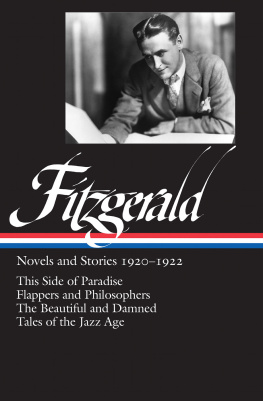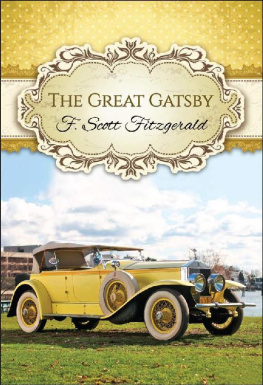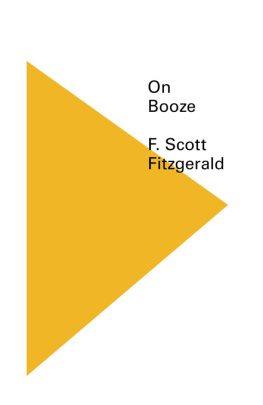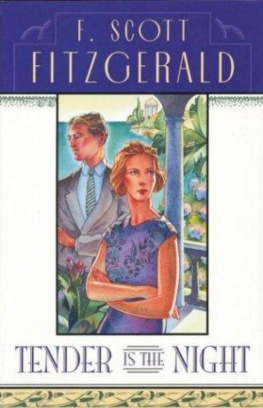Pagebreaks of the print version



Some Sort of Epic Grandeur
The Life of F. Scott Fitzgerald
Matthew J. Bruccoli

I am not a great man, but sometimes I think the impersonal and objective quality of my talent, and the sacrifices of it, in pieces, to preserve its essential value has some sort of epic grandeur.
F. Scott Fitzgerald
To Scottie
For 9 October 1964
I am the last of the novelists for a long time now.
There never was a good biography of a good novelist. There couldnt be. He is too many people if hes any good.
Biography is the falsest of the arts. That is because there were no Keatzians before Keats, no Lincolnians before Lincoln.
I left my capacity for hoping on the little roads that led to Zeldas sanitarium.
The voices fainter and fainterHow is Zelda, how is Zeldatell ushow is Zelda.
Genius is the ability to put into effect what is in your mind. Theres no other definition of it.
I look out at itand I think it is the most beautiful history in the world. It is the history of me and of my people. And if I came here yesterday like Sheilah I should still think so. It is the history of all aspirationnot just the American dream but the human dream and if I came at the end of it that too is a place in the line of pioneers.
Then I was drunk for many years, and then I died.
From the Notebooks
ILLUSTRATIONS
Photographs identified as from the Bruccoli Collection are in the Matthew J. and Arlyn Bruccoli Collection of F. Scott Fitzgerald, Thomas Cooper Library, University of South Carolina.
Scottie Fitzgerald Smith, ca. 1981
Mollie McQuillan Fitzgerald with her son
Fitzgeralds birthplace
Fitzgerald, ca. 1899
Edward Fitzgerald with his son
Fitzgerald at age fifteen
Monsignor Cyril Sigourney Webster Fay
Front cover for Fie! Fie! Fi-Fi!
John Peale Bishop
Edmund Wilson
Ginevra King
Fitzgerald as Show Girl, Princeton
Fitzgerald at Princeton
1917 Tiger board, Princeton
Zelda Sayre in dancing costume
Maxwell E. Perkins
Harold Ober 103
Fitzgeralds first appearance on a Post cover
Dust jacket for This Side of Paradise
Zelda Sayre Fitzgerald at the time of her marriage
H. L. Mencken and George Jean Nathan
Portrait of Zelda Fitzgerald by Gordon Bryant
Portrait of F. Scott Fitzgerald by Gordon Bryant
John Held, Jr.s dust jacket for Tales of the Jazz Age
Ring Lardner
Undated clipping inscribed by Max Gerlach
Zelda and Scottie Fitzgerald, 1923
Villa Marie
The Fitzgeralds on the Riviera, 1924
Edouard Jozan
Fitzgerald at the time he was writing The Great Gatsby
Opening page of the manuscript of The Great Gatsby .
Final page of The Great Gatsby
Fitzgeralds rewritten galley 20 from Chapter IV of The Great Gatsby
Cugats preliminary sketch for the Great Gatsby dust jacket
Fitzgerald and Scottie on the Riviera
Accounting page from Fitzgeralds Ledger
The Fitzgeralds, Christmas 1925
The Fitzgeralds, 19251926
Gerald and Sara Murphy
Lois Moran with Ronald Colman in Stella Dallas
Ellerslie
Fitzgerald allegedly judging a beauty contest
Revised typescript for The Swimmers
Ernest Hemingway
Autobiographical page from Fitzgeralds Ledger
Les Rives de Prangins
Zelda at the time of her discharge from Prangins clinic
La Paix
A Fitzgerald chart for Tender Is the Night
The Lobster Quadrille by Zelda Fitzgerald
Untitled painting of dancers by Zelda Fitzgerald
Dust jacket for the first edition of Tender Is the Night
Letter from Zelda to Scott, 1934
Fitzgerald and Scottie in Baltimore
Fitzgeralds plan for his collected works
Fitzgerald, 4 June 1937
Poster for Three Comrades
Sheilah Graham
Fitzgeralds chart for 19311938
Reading list from the College of One
Fitzgerald and Sheilah Graham in Tijuana
Budd Schulberg and Ann Sheridan on the set of Winter Carnival
Latest outline for The Love of the Last Tycoon
Fitzgerald and John OHara
The last page of the working draft for The Love of the Last Tycoon
Presentation of the Fitzgerald Papers
NOTE FOR THE SECOND REVISED EDITION
When this biography was first published by Harcourt Brace Jovanovich in 1981, my claim that its publication was justified by more facts did not pass unnoticed. One practicing biographer protested that biography should not be limited by facts. A one-book biographer declared that too much evidence interferes with the free play of the biographers insights. It is free because it has not been paid for by research; it may indeed become a form of play.
Facts are the only things a biographer can trustand only after they have been verified. Insights are as good as the evidence that supports them. This revised edition of Some Sort of Epic Grandeur provides still more facts, as well as corrections of the first edition.
Scottie Fitzgerald died 18 June 1986. She was the best thing I got from F. Scott Fitzgerald. This is the truth: I could not and would not have done my Daddy books without Scottie. She provided material and contacts. She made it all fun. The party is over.
M.J.B.
21 August 2001
PREFACE TO THE FIRST EDITION
Many of us share Samuel Johnsons declaration that the biographical part of literature is what I love most. But the popularization of the F. Scott Fitzgerald biography into mythology has diminished his stature and cheapened his work. He is regarded by a certain kind of Twenties buff as having scribbled his masterpieces during the course of a lifelong bender. Given the kind of writer he was, it is proper to identify Fitzgerald with his material; but it is a distortion of the record to portray him as an uncritical reveler. There was always a judging process operating in himcombined, in his finest work, with a quality of aspiration. Zelda Fitzgerald observed after her husbands death: I do not know that a personality can be divorced from the times which evoke it I feel that Scotts greatest contribution was the dramatization of a heart-broken + despairing era, giving it a new raison-detre in the sense of tragic courage with which he endowed it.
Fitzgerald generated his own legends. His life overshadows his work as he has become an archetypal figureor a covey of archetypes: prince charming, the drunken writer, the ruined novelist, the spoiled genius, the personification of the Jazz Age, the sacrificial victim of the Depression. These images were largely his own fault because he dramatized his success and failure. Relishing attention, he embraced his symbolic roles. The glamour, the triumph, the euphoria, the heartbreak, and the tragedy of his life were genuine; but the most important thing is what he wrote. Everything else matters only to the extent that it explicates his work or clarifies his career. It is impossible to dissociate a great writer from his work, and Fitzgerald was an intensely personal author. My intention in writing this biography was to focus on Fitzgerald as writer by tracing the ontogeny of his major work while providing a detailed account of his career as a professional author.

